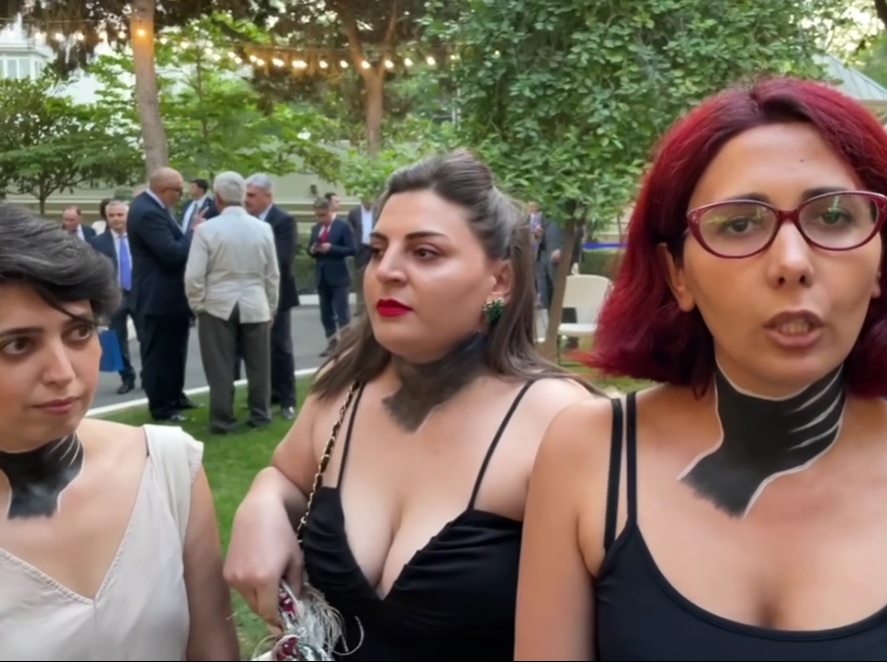It’s common practice around the world for protests to be staged outside foreign embassies. It’s exceedingly rare for them to occur inside the walls of a diplomatic compound.
But that’s what happened at a reception marking American Independence Day at the U.S. embassy in Baku on June 23.
Three invited guests, local women’s rights activists, removed scarves from around their necks to reveal black hands painted on their throats symbolically strangling them.
They had a message for the Azerbaijani government officials and MPs attending the reception with them.
“Rights are violated in Azerbaijan. They [authorities] are grabbing people’s throats with their hands,” Sanubar Heydarova, one of the three, said as Ulvi Hasanli, director of the local independent news outlet Abzas Media, recorded her on video.
“Today the government and opposition have come here to celebrate the independence of another country, while independence in Azerbaijan has been choked, the voice of media has been choked, and activists are arrested and subjected to torture,” said another activist, Gulnara Mehdiyeva.
They expressed solidarity with the people of the village of Soyudlu, which had been (and still is) under tight police control since the violent dispersal of an environmental protest there three days earlier.
As Hasanli’s camera continued to roll, the activists were approached by embassy staff who asked them to stop protesting and filming. They responded that they were engaged in a “quiet, civil protest” not aimed at disrupting the event.
A short time later another video, showing Hasanli being apprehended by Azerbaijani police, was posted on social media. Though it can’t be seen in the footage, Hasanli had reportedly been handed over to the police by embassy security personnel. The activists, meanwhile, were asked to leave the embassy, and they too were detained by police. All four were released shortly afterward.
After his release, Hasanli vented his frustration on Facebook. “This time, I am concerned about the U.S. embassy,” he said in a sarcastic reference to routine diplomatic expressions of “concern” over frequent human rights violations in Azerbaijan.
“The embassy of a country which speaks so much about democracy, human rights, and press freedom shouldn’t have acted like that.”
He later told Eurasianet that his only grievance was the embassy’s cooperation with the Azerbaijani police. “If the embassy had simply removed me from the embassy grounds because of my filming, I would have understood and would not have had any resentment,” he said. “But it is disgraceful that the embassy staff took me out of the area forcefully, twisting my arms, and handed me over to the Azerbaijani police. The embassy should apologize for this.”
He added that they requested a meeting at the embassy for an explanation and had not received a reply.
In response to an email query from Eurasianet, the embassy provided a statement that did not address the question of embassy staff’s cooperation with the police.
“Much of the night was a chance to network, share the diversity of the United States, and celebrate the official event. The U.S. embassy supports fundamental freedoms including the right to protest and freedom of speech,” the statement read.
Hasanli’s discontent is reflective of wider exasperation among Azerbaijani civil society activists, who wish the U.S. and other Western democracies would push back harder against the repressive policies of strongman President Ilham Aliyev.
“We can see that the embassies of the Western countries, particularly those that declared issues of democracy and human rights as priorities in their foreign policies – such as the U.S., the UK, France, and Germany – have chosen to remain mere observers of Azerbaijan’s domestic political processes,” Baku-based political analyst Anar Mammadli told Eurasianet. “They had the same position when the political parties law and the media law were adopted in Azerbaijan, and have the same reaction in light of the Soyudlu events.”
But Mammadli did acknowledge the difficult balance that Western countries have to strike in their relations with Azerbaijan – a hydrocarbon-rich ally geographically situated between strategic adversaries Russia and Iran.
“It seems to me that they [Western embassies] prefer to engage in ‘silent diplomacy,'” he said, noting diplomats’ assurances that they communicate civil society concerns to government officials. “And this is understandable. These countries have geopolitical interests here, not to mention that they try to keep warm relations with the Azerbaijani government given the threat to their energy security in the aftermath of the Ukraine invasion.”
Maran Turner, the director of Freedom Now, a U.S. non-profit that has supported local civil society and worked to address human rights violations in Azerbaijan for more than 10 years, said she understood the motivation of the protesters and their choice of venue.
“The US embassy event would have offered a unique opportunity to directly confront many government officials, and to do so in the presence of the Baku international community. Though a U.S.-hosted event on U.S. embassy grounds is not the ideal place for such a demonstration against the Azerbaijani government, it is hard to begrudge these activists for taking this opportunity,” Turner told Eurasianet in an email.
“With regard to the removal of the activists from the event, I do not know whether there was a protocol that was followed by the U.S. embassy in this situation. It is regrettable, however, that the protestors and the journalist with them were not simply escorted off the premises as opposed to detained, however briefly, by local police. Nevertheless, I do not believe that this incident should be taken as indicative of a lack of support by the U.S. embassy for civil society or their right to protest. The U.S. embassy is among the most ardent supporters of local civil society in Azerbaijan, and I have no doubt they will continue to offer support and amplify local concerns and criticisms with Azerbaijani officials.”
Source : Eurasianet


